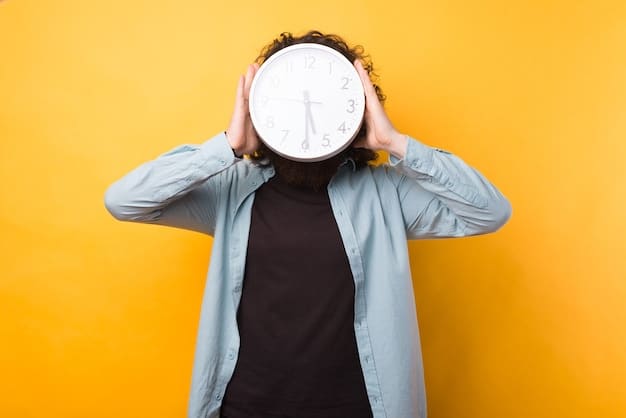Maximize Health Benefits During Daylight Saving Time: Tips & Tricks

Daylight Saving Time (DST) can disrupt your body’s natural rhythm, but with strategic adjustments and a proactive approach, you can minimize its negative effects and even enhance your well-being. This involves optimizing sleep schedules, sunlight exposure, dietary habits, and exercise routines to align with the seasonal time shift.
Daylight Saving Time arrives, bringing longer evenings, but also potential disruptions to your health. Discover how to maximize your health benefits during Daylight Saving Time with these tips, ensuring a smooth transition and improved well-being.
Understanding the Impact of Daylight Saving Time on Your Body
Daylight Saving Time (DST) is more than just an annual clock-shifting event. It has a tangible influence on our bodies, primarily due to its effect on our circadian rhythm. Grasping these impacts is the first step in mitigating potential health consequences.
The Circadian Rhythm and DST
Our circadian rhythm, often referred to as our internal clock, is a natural, internal process that regulates the sleep-wake cycle and repeats roughly every 24 hours. This rhythm is heavily influenced by environmental cues, with sunlight being the most significant.
DST’s Disruption
When DST arrives, we essentially lose an hour of sleep. This abrupt change disrupts the circadian rhythm, leading to a cascade of potential health issues. These can range from minor inconveniences to more serious health concerns.
- Sleep Deprivation: The most immediate effect is a reduction in sleep duration, leading to fatigue and decreased alertness.
- Hormonal Imbalance: Disruption of the circadian rhythm can affect hormone production, including melatonin (sleep hormone) and cortisol (stress hormone).
- Mood Changes: Lack of sleep and hormonal imbalances can contribute to mood swings, irritability, and increased risk of depression.
- Physical Health: Studies have linked DST to increased risk of heart attacks, strokes, and other cardiovascular events.
Understanding these potential impacts allows us to take proactive measures to minimize the negative effects of DST and promote overall health. By adjusting our routines and adopting healthy habits, we can better adapt to the time change and maintain our well-being.

Prepare Your Sleep Schedule Before the Change
One of the most effective ways to minimize the negative impact of Daylight Saving Time (DST) is to proactively adjust your sleep schedule in the days leading up to the time change. This gradual transition can help your body adapt more smoothly.
Start Early
Begin making small adjustments to your sleep schedule about a week before DST. This gives your body ample time to adapt to the change. Avoid making drastic changes overnight, as this can be counterproductive.
Gradual Adjustments
Shift your bedtime and wake-up time by 15-20 minutes earlier each day. This incremental approach allows your body to gradually adjust to the new schedule without experiencing a sudden shock. Consistency is key.
- Maintain Regularity: Even on weekends, stick to your adjusted sleep schedule. This helps reinforce your body’s natural sleep-wake cycle and promotes better sleep quality.
- Optimize Sleep Environment: Ensure your bedroom is dark, quiet, and cool. Use blackout curtains, earplugs, or a white noise machine to minimize distractions and create an optimal sleep environment.
- Avoid Screens Before Bed: The blue light emitted from electronic devices can interfere with melatonin production, making it harder to fall asleep. Avoid screens for at least an hour before bedtime.
By preparing your sleep schedule in advance, you can mitigate the sleep deprivation associated with DST and ensure a smoother transition. This proactive approach can significantly improve your overall well-being and help you feel more rested and energized.
Optimize Your Exposure to Sunlight
Sunlight is a powerful regulator of our circadian rhythm, playing a crucial role in maintaining our sleep-wake cycle and overall health. During Daylight Saving Time (DST), strategically optimizing your exposure to sunlight can help you adapt more quickly and effectively.
Morning Sunlight is Key
Prioritize exposure to natural sunlight in the morning. This helps signal to your body that it’s time to wake up and can suppress the production of melatonin, the sleep hormone. Aim for at least 30 minutes of sunlight exposure each morning.
Get Outside
If weather permits, spend time outdoors. Take a walk, have breakfast on your patio, or simply sit outside and enjoy the morning sun. The fresh air and natural light can do wonders for your mood and energy levels.
- Adjust Indoor Lighting: If you can’t get outside, use bright, full-spectrum lights indoors. These lights mimic natural sunlight and can help regulate your circadian rhythm.
- Time Your Exposure: Be mindful of the timing of your sunlight exposure. Avoid excessive exposure to sunlight in the evening, as this can delay the release of melatonin and make it harder to fall asleep.
- Consider Light Therapy: If you struggle with seasonal affective disorder (SAD) or experience significant mood changes during DST, consider using a light therapy box. Consult with a healthcare professional to determine if light therapy is right for you.
Optimizing your exposure to sunlight is a simple yet effective way to support your body’s adaptation to DST. By prioritizing morning sunlight and being mindful of light exposure throughout the day, you can help regulate your circadian rhythm and improve your overall well-being.
Adjust Your Dietary Habits
What you eat and when you eat it can significantly impact your sleep-wake cycle and overall health, especially during Daylight Saving Time (DST). Making strategic adjustments to your dietary habits can help you adapt more easily and minimize the negative effects of the time change.
Regular Meal Times
Maintain regular meal times, even on weekends. This helps regulate your body’s internal clock and promotes better digestive health. Avoid skipping meals or eating at irregular hours.
Limit Caffeine and Alcohol
Reduce your intake of caffeine and alcohol, especially in the evening. Both substances can interfere with sleep and disrupt your circadian rhythm. Caffeine is a stimulant, while alcohol can disrupt the later stages of sleep.
- Avoid Heavy Meals Before Bed: Eating a large meal close to bedtime can interfere with sleep. Opt for a light, healthy snack if you’re hungry before bed.
- Stay Hydrated: Drink plenty of water throughout the day, but limit your fluid intake in the evening to avoid frequent nighttime trips to the bathroom.
- Consider Sleep-Promoting Foods: Certain foods, such as bananas, almonds, and chamomile tea, contain nutrients that can promote relaxation and better sleep.
Adjusting your dietary habits is a powerful tool for managing the effects of DST. By maintaining regular meal times, limiting caffeine and alcohol, and choosing sleep-promoting foods, you can support your body’s natural rhythm and promote better sleep quality.

Incorporate Regular Exercise into Your Routine
Regular physical activity is essential for overall health and well-being, and it can be particularly beneficial during Daylight Saving Time (DST). Exercise can help regulate your sleep-wake cycle, boost your mood, and improve your energy levels.
Time Your Workouts Wisely
Be mindful of the timing of your workouts. Avoid intense exercise close to bedtime, as this can interfere with sleep. Aim to exercise earlier in the day, ideally in the morning or early afternoon.
Outdoor Activities
Take advantage of the longer daylight hours by engaging in outdoor activities. Walking, running, cycling, or simply spending time in nature can help regulate your circadian rhythm and boost your mood.
- Consistency is Key: Aim for at least 30 minutes of moderate-intensity exercise most days of the week. Consistency is more important than intensity when it comes to regulating your sleep-wake cycle.
- Listen to Your Body: Pay attention to how your body responds to exercise. If you’re feeling fatigued, reduce the intensity or duration of your workouts.
- Stay Active Throughout the Day: Incorporate small bursts of activity throughout the day, such as taking the stairs instead of the elevator or walking during your lunch break.
Incorporating regular exercise into your routine is a valuable strategy for managing the effects of DST. By timing your workouts wisely, engaging in outdoor activities, and staying active throughout the day, you can support your body’s natural rhythm and improve your overall well-being.
Manage Stress and Prioritize Relaxation
Stress can exacerbate the negative effects of Daylight Saving Time (DST), making it harder to adapt to the time change and maintain your well-being. Managing stress and prioritizing relaxation is crucial for a smooth transition.
Mindfulness and Meditation
Practice mindfulness and meditation to calm your mind and reduce stress. Even a few minutes of daily meditation can make a significant difference in your stress levels.
Relaxing Activities
Engage in relaxing activities, such as reading, listening to music, or taking a warm bath. These activities can help you unwind and prepare for sleep.
- Limit News and Social Media: Avoid excessive exposure to news and social media, especially in the evening. These sources can be overwhelming and contribute to stress.
- Connect with Loved Ones: Spend time with family and friends. Social connection can help reduce stress and boost your mood.
- Practice Deep Breathing: Deep breathing exercises can help calm your nervous system and reduce anxiety. Take a few deep breaths whenever you’re feeling stressed.
Managing stress and prioritizing relaxation is an essential part of adapting to DST. By incorporating mindfulness, engaging in relaxing activities, and connecting with loved ones, you can reduce stress levels and promote better sleep quality.
| Key Point | Brief Description |
|---|---|
| ⏰ Adjust Sleep | Shift bedtime gradually before DST to ease the transition. |
| ☀️ Sunlight | Maximize morning sunlight exposure to regulate your circadian rhythm. |
| 🥗 Diet | Maintain regular meal times and limit caffeine/alcohol intake. |
| 💪 Exercise | Incorporate regular exercise, timing workouts wisely to avoid sleep disruption. |
Frequently Asked Questions
▼
Daylight Saving Time disrupts your body’s natural circadian rhythm, which regulates sleep, hormone production, and other vital functions. This disruption can lead to sleep deprivation, mood changes, and increased stress.
▼
Start adjusting your bedtime and wake-up time by 15-20 minutes earlier each day for a week before DST. This gradual approach helps your body adapt more smoothly to the time change and minimizes sleep disruption.
▼
Certain foods, such as bananas, almonds, and chamomile tea, contain nutrients that can promote relaxation and better sleep. Avoid heavy meals, caffeine, and alcohol close to bedtime to improve sleep quality.
▼
It’s generally better to exercise earlier in the day, ideally in the morning or early afternoon. Avoid intense exercise close to bedtime, as this can interfere with sleep. Outdoor activities can also help regulate your circadian rhythm.
▼
Practice mindfulness and meditation to calm your mind and reduce stress. Engage in relaxing activities, such as reading or listening to music. Limit news and social media exposure, and connect with loved ones to help manage stress.
Conclusion
Daylight Saving Time can pose challenges to our health, but with proactive strategies, we can minimize its negative effects and even enhance our well-being. By preparing your sleep schedule, optimizing sunlight exposure, adjusting dietary habits, incorporating regular exercise, and managing stress, you can navigate DST with ease and maintain a healthy, balanced lifestyle.





